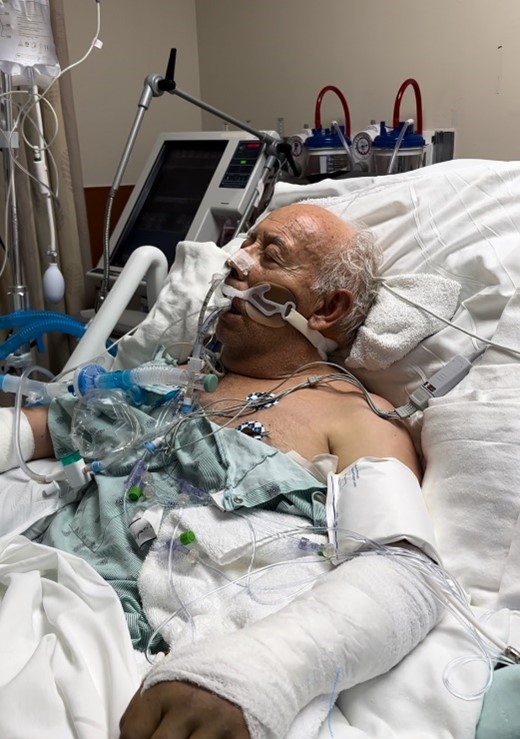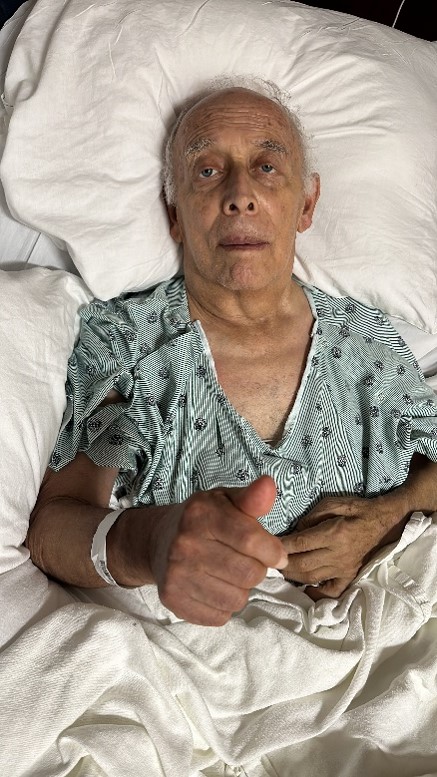From Posturing to Recovery: My Dad’s Story of Hope
Published on: November 12, 2024
It was 2022 and I was loving the intern year of my Neurology residency. My dad and nieces were visiting for the Christmas holiday, a visit I had long awaited. We are all from Ecuador, and moving away from my dad while he struggled with Parkinson’s disease was challenging for me. But I had no idea what was to come—during his stay, an unexpected event would change our lives while teaching me an impactful lesson in how I practice medicine.
I woke up early one day and went to the living room to study. My dad was sleeping and snoring, which wasn’t unusual for him. However, I suddenly noticed his breathing pattern had changed. My dad, the man who had raised me with unconditional love and motivated me to be a neurologist, was posturing right in front of me. His body was cold and rigid. I had read about such a phenomenon, but I’d never seen this before in real life, nor did I expect to be witnessing it firsthand while at home—especially not in my father.
I immediately approached him and saw that he was cyanotic and without a palpable pulse. I started CPR and my husband called 911. After two cycles of CPR the only thing I could think about was ‘”time is brain!’’ I knew that every second of unresponsiveness could negatively affect his outcomes, so I made the call to take him to the ER. My husband carried my dad in his arms to the car and continued CPR while I was driving. Luckily, we lived only a few blocks from the hospital where I was training. When we arrived at the hospital, the ER confirmed that my dad was in cardiac arrest with pulseless electrical activity (PEA) and continued with efforts to resuscitate him. After two more rounds of CPR and a dose of epinephrine the rhythm strip started to show cardiac activity—he was in atrial fibrillation and his pulse had returned. In the meantime, the team worked to identify and treat multiple broken ribs, blood in his lung (hemothorax), and low blood pressure.
Why did this happen? I couldn’t stop thinking about the differential diagnosis for cardiac arrest. Stroke and heart attack had been ruled out by his team, which left pulmonary embolism at the top of the list. Unfortunately, his blood pressure was too low and he was too unstable to get the imaging needed to confirm the diagnosis. When he got to the ICU, his team temporarily lowered his temperature in an effort to protect his brain. While the cause of my dad’s cardiac arrest remained a mystery during his hospitalization, we later learned that it was indeed likely due to blood clots in his lungs.
|
 My dad after being admitted to the ICU My dad after being admitted to the ICU
|
As with any patient in the ICU, complications can occur and pose significant challenges for the care team, while imposing a significant emotional toll on our family. As the only English-speaking person and physician in my family, I felt a lot of responsibility for his care resting on my shoulders. Every day was a struggle. I had pursued medicine to save lives, but this was more than a responsibility—it felt like a mission, because it was all happening in my dad. I vividly remember one day I went home to shower when the nurse called me: “Doctor, I can’t find any brainstem reflexes in your dad. Can you come, please?” I quickly returned, and when I examined my dad I found that he still had some brainstem reflexes but that they were minimal—and this time I truly felt that death was knocking on his door.
I explained the situation to my family, and we went to spend Christmas in the hospital at my dad’s bedside. We learned to talk to him without asking for a response, just hoping he would listen. Our Christmas wish was for him to recover, which at that time seemed truly improbable. I was there as both a daughter and a physician, and every day of his admission I would look for any neurological response, my heart filled with hope and faith. Finally, a week after his cardiac arrest, he finally squeezed my hand and opened his eyes. It was a uniquely rewarding experience, and it was the beginning of better times.
|
 Thumbs up for being ready to leave the hospital Thumbs up for being ready to leave the hospital
|
Nearly every day afterwards, I had to explain to yet another oncoming nurse or physician that my dad's prior level of functioning was limited due to his bradykinesia. My dad had been living independently but required some assistance from an aide. He used a walker to ambulate and had experienced dyskinesias related to long-term use of his Parkinson’s disease medications, which he had been on since 2009. I remember that whenever the ICU team would assess my dad, they would refuse to extubate him because he did not fulfill their extubation criteria. It took me time to convince them that it was not possible to expect a quick response from a patient with Parkinson’s disease, because bradykinesia had become a part of who he was. The ICU team eventually agreed to a trial of extubation, and he ended up doing amazingly well, so we were luckily able to avoid a tracheostomy. We had similar conversations when it came to discussing the potential need for a feeding tube, and he was able to make it through his hospitalization without needing one. Throughout this experience, I started to internalize and understand some key concepts that now make me a better doctor: knowing your patient’s baseline is as essential as knowing their vital signs, and every person’s response might differ depending on their comorbidities and baseline.
After fifteen days in the ICU and ten days on the inpatient floor, my dad was discharged—not just alive, but breathing, talking, and expressing immense gratitude to Larkin Community Hospital in South Miami. When I spoke with him about his experience at the hospital, he made me realize that even though he was in a coma, he was aware of his surroundings. Despite remembering being scared in the hospital without knowing what had happened, the sound of our voices brought him a sense of reassurance and eased his fear. He was able to recognize the voices of several physicians who had examined him and discussed his case in front of his seemingly inert body for days. His insights taught me a great lesson: although patients may seem not to be listening, we must always be kind and compassionate to them.Critical care goes beyond seeing and managing monitors, and this experience taught me to treat my patients as if they are my family. As doctors, we have a mission to give the best care to our patients—but adding love, kindness, and compassion makes the difference between being a good doctor and a special one. Let us all commit to making health care more personal and grounded in love, so we can improve the care of all our patients and families and make a difference in their lives.
Acknowledgements
My dad’s life would not have been saved without the guidance of Dr. Pooja Patel, an outstanding resident, and attendings such as Dr. George Michel, Dr. Wilson Cueva, and Dr. Hector Lalama. I also want to express my heartfelt gratitude to my family for their unwavering support in allowing me to share our father's story. Finally, I am deeply thankful to Lia Franco, MD, Mikaela Camacho, MD, and Julia Watson for their thoughtful review of the manuscript.